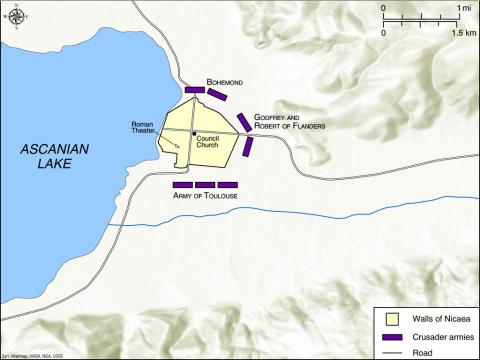The Siege of Nicaea
[2.8.4] Modo vēnit comes dē Nortmannīā, et comes Stephanus, et aliī plūrēs, ac deinceps Rogērius dē Barnavilla. Boamundus dēnique obsēdit urbem in prīmā fronte, et iuxtā eum Tancredus, et posteā dux Godefridus, ac deinde comes Flandrēnsis, iuxtā quem Rotbertus Nortmannus, et iuxtā eum comes Sānctī Egidīī, iuxtā quem Podiēnsis epīscopus. Ita vērō per terram fuit obsessa, ut nēmō audēret exīre neque intrāre. Fuēruntque ibi omnēs congregātī in ūnum: et quis poterat numerāre tantam Chrīstī mīlitiam? Nūllus, ut putō, tot prūdentissimōs mīlitēs nec anteā vīdit nec ultrā vidēre poterit.
[2.8.5] Erat autem ex ūnā parte urbis immēnsus lacus, in quō Turcī suās mittēbant nāvēs, et exībant et intrābant, et afferēbant herbam, ligna et alia plūra. Tunc nostrī māiōrēs, cōnsiliātī in ūnum, mīsērunt nūntiōs Cōnstantīnopolim, dictūrōs imperātōrī, ut faceret nāvēs condūcī ad Civītō, ubi portus est, atque iubēret congregārī bovēs, quī eās traherent per montānās et silvās, usque approximent lacuī. Quod continuō factum fuit, suōsque Turcopūlōs mandāvit cum eīs. Dīē vērō quō nāvēs fuerant conductae, nōluērunt eās statim mittere in lacum; sed nocte superveniente mīsērunt eās in ipsum lacum, plēnās Turcopōlīs bene ōrnātīs armīs.
notes
vocabulary
2.8.4
deinceps: then, next
obsideō obsidēre obsēdī obsessum: to besiege, blockade (OLD 4.)
ultrā: subsequently, thereafter (OLD 2.)
2.8.5
cōnciliō (1): to come together, unite (CL); to engage in consultations, take counsel (ML)
continuō: forthwith, immediately


